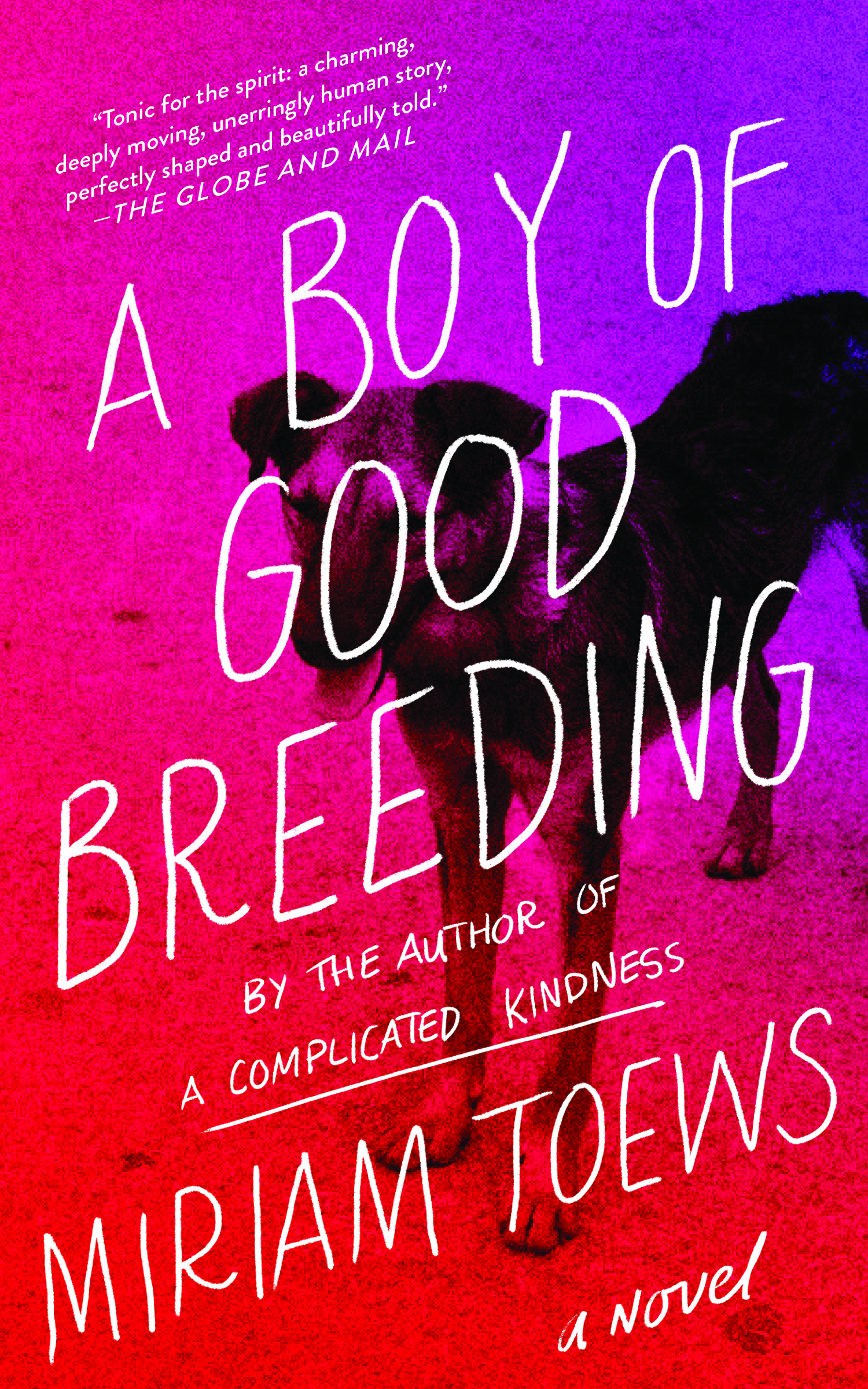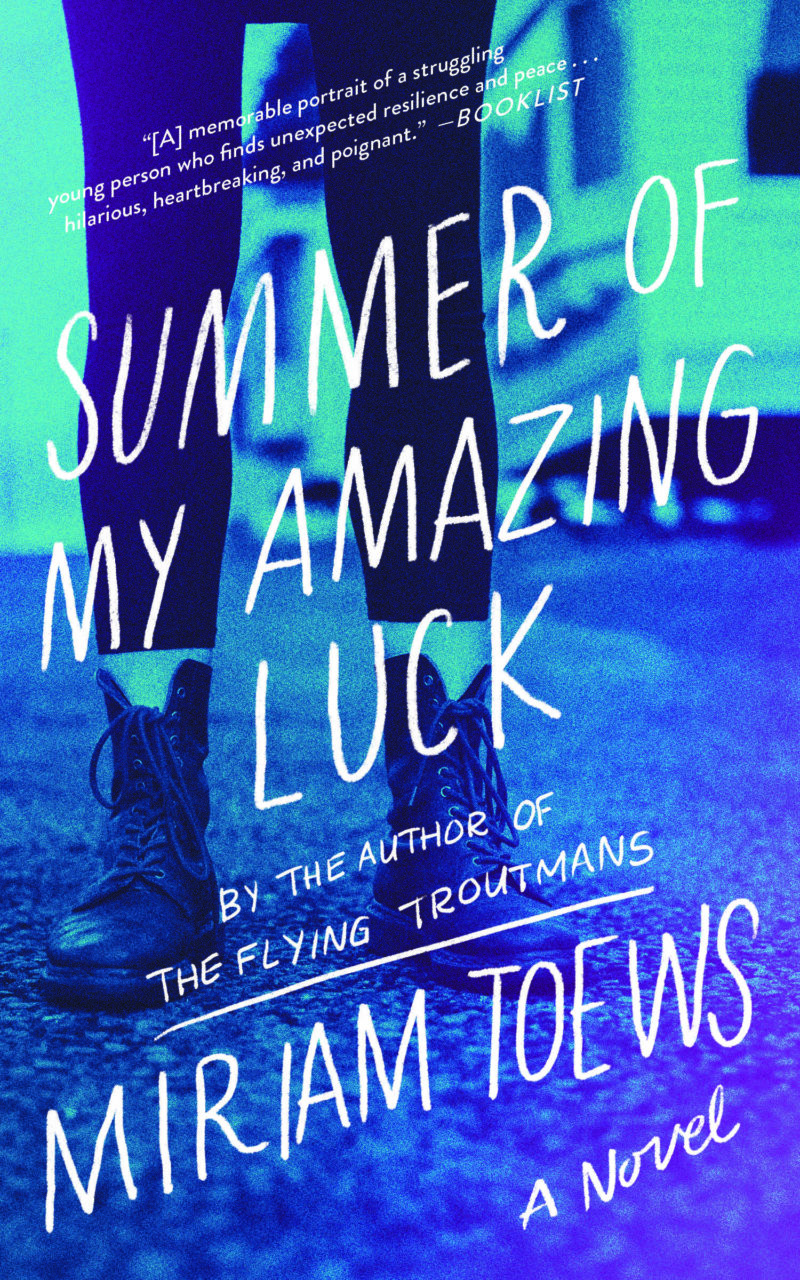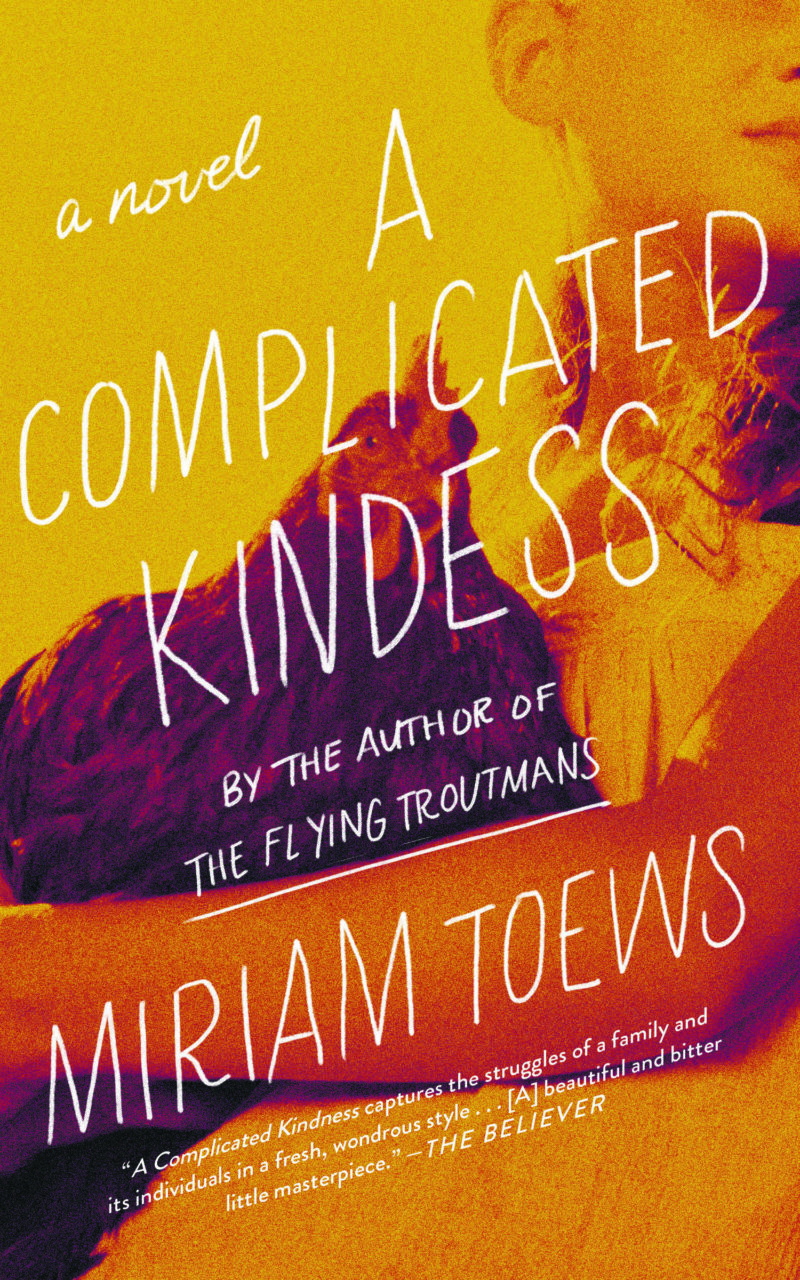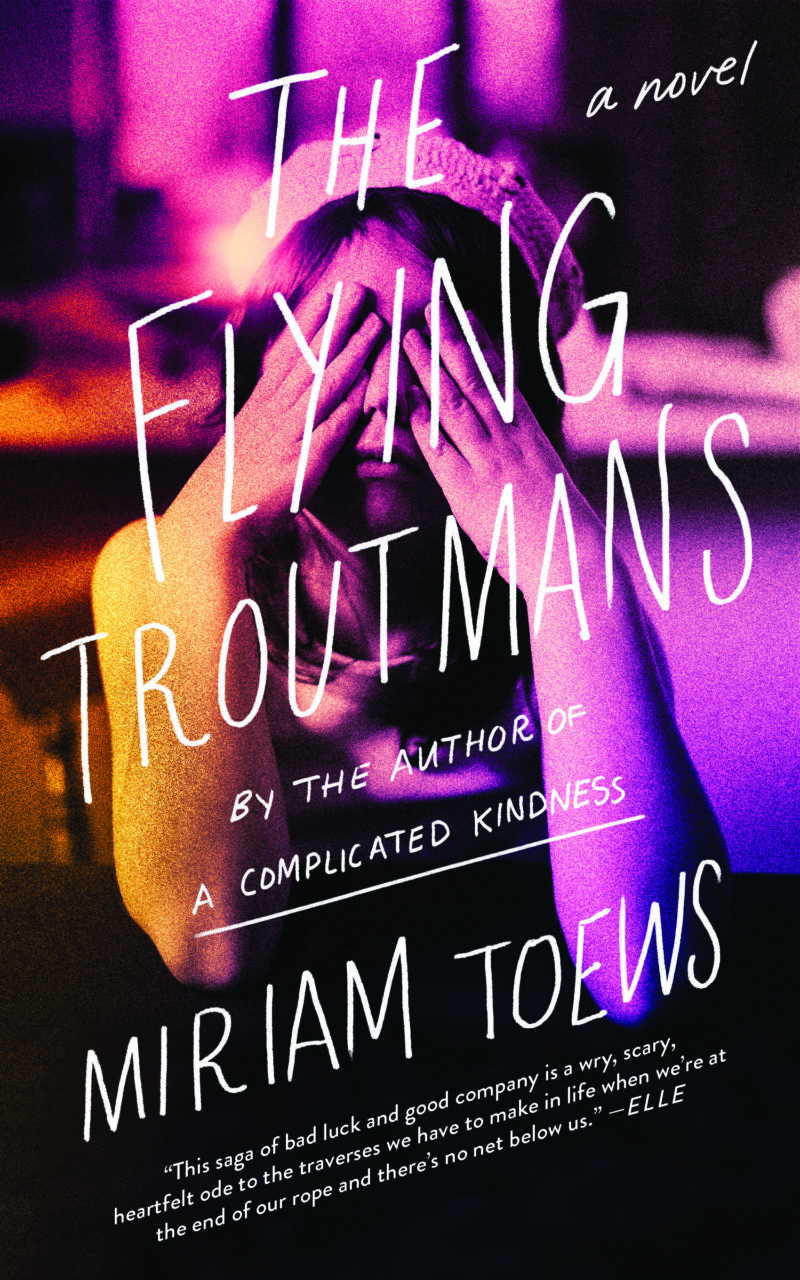
Format: 240pp, 256pp, 272pp, 288pp, paperbacks; Size: 5.0 x 8.0; Price: $16.95 each; Number of books: four; Publisher: Counterpoint Press; Author’s Relationship to Chicago Blackhawks Forward Jonathan Toews: Unconfirmed, so as to preserve hope; Number of Families, Per Book, Trying Their Best Despite The Circumstances: 1; Representative Passage: “When Tash was four and I was a fat baby she threw herself out of a tree and broke her elbow in two places. She thought that God had saved her life. She could just as easily have broken her neck and died. Then she had wanted to throw me out of a tree to test God’s love and my mom said no, there are such things as accidents.”
Central Question: So, what are they gonna do about it?
In Miriam Toews’s debut novel, Summer of My Amazing Luck, she sends two of her characters and their combined five kids out on a road trip. Toews spends much of the lead up to the trip emphasizing the logistical difficulties that the adults, Lucy and Lish, have to navigate just to get on the road, and while things start off smoothly, Toews is just lulling readers into a false sense of confidence. Before long, things go badly, quickly:
In the fifteen minutes it took us to reach the border Letitia had removed her dress and panties and shoes and sat stoically, completely naked, in the back of the van. Alba was waving Letitia’s panties out of the window, threatening to show them to passerby. Letitia refused even to look at her, let alone take the bait and lunge for her panties. Hope and Maya were arguing about how many planets there are, nine or ten or thirteen or twenty-three, and Dill was back in his car seat chewing on an uncapped Crayola marker. A glorious fuchsia dye stained his lips, his teeth, his tongue, his cheeks, his hands, and his saliva, mixed with breast milk, was drooling out of the side of his mouth in fuchsia.
This scene is pure chaos, the sort of calamity that could befall most parents, given the right circumstances. One inconvenience follows another, and then another, until it seems that everything has spun out of control.
Toews has spent most of her career refining her portrayals of how disorder—both internal and societal—can so easily overtake the family. Now readers can observe this process of refinement through her first four novels, which Counterpoint Press reissued earlier this year. As Toews has matured as a writer, she’s excelled at demonstrating how easily control can slip from our grasp, ceding ground to disorder — especially in the context of the family. She excels at engineering a constant sense of teetering on the edge of disarray, of occupying a position where it is possible to fall into for any number of things to go wrong in any number of different ways.
In the follow-up to her debut, A Boy of Good Breeding, Toews tells the story of Hosea Funke, the mayor of small Canadian town hoping to be crowned “Canada’s Smallest Town.” Even as control over his own turbulent domestic life threatens to slip from between his hands—he has an out-of-town girlfriend who would like to move within him, and though he’s not theoretically opposed, he’s concerned it would make the town too big—he frequently involves himself in his citizens’ private matters. Hosea is often poking around the hospital, bothering the doctor for information about who is on the verge of birth or death. He disguises his engagement with their affair as routine mayoral business, but his actual goal to keep the population at exactly 1500—the number of citizens Algren must maintain to be considered a town rather a village, and therefore eligible for a visit from the Prime Minister on Canada Day. His meddling makes him privy to a variety of chaotic familial situations.
For example: one of the novel’s other central characters, Knute, is raising her daughter Summer Feelin’ by herself, the father having skipped out. He returns to town and, despite his bad reputation, appears to be interested in righting his wrong. To most people, this is a good thing. But where others might see hope for reconciliation, Hosea can’t help but see his plan’s disruption:
“He knew Max and Knute were a happy couple these days… he’d been hoping Max would leave town again, mysteriously disappear like before, in fact he was sure it would happen, and now…it wasn’t happening. But of course he was happy for Max and Knute and Summer Feelin’, he just, dammit, he just needed Max to leave. He needed him to leave, anybody really, he had thought Max would be the natural choice.”
 This type of cynicism is unique to Hosea among Toews’s characters; she most often writes from within the familial structure, not against it. By representing Max and Knute’s relationship through the eyes of someone who wants to see it broken up, Toews tempers reader expectations about their hope for a future together, underscoring how forces out of the family’s control work to undermine, and even upend, familial order.
This type of cynicism is unique to Hosea among Toews’s characters; she most often writes from within the familial structure, not against it. By representing Max and Knute’s relationship through the eyes of someone who wants to see it broken up, Toews tempers reader expectations about their hope for a future together, underscoring how forces out of the family’s control work to undermine, and even upend, familial order.
It is not just meddling mayors that Toews sees as potential stirrers of disorder and disillusion. In her next book, A Complicated Kindness, Toews explores the pressure that living in a Mennonite town exerts on a family of emerging non-believers. The novel is narrated by Nomi, a teenager managing her present while trying to reckon with the events of her recent past. Both her older sister Tash and their mother had to leave their town because of their break from the Menonnite church. Toews is clear on the severe consequences this disillusion causes, but she does it alongside an acknowledgement that the aftermath of the family’s break with the church is no more chaotic than the status quo:
“One day there was no supper and I got mad. What a spoiled little shit, eh? Anyway, I told her: Mom, we have to eat every day. And she said to me you know you’re absolutely right and then she went over to the calendar and wrote the word EAT in every square, every day of every week of every month. There, she said when she was finished. That should help.”
This earnest but ultimately futile attempt at controlling their world only makes the departure of Nomi’s mother and sister—which, thanks to the nonlinear structure of the book, has happened, is happening, and will happen, constantly—sting worse.
After her sister leaves, Nomi tries to understand how and why this disruption has happened. The prospect of understanding promises a facsimile of control, an approximation that might be close enough to the real thing to feel fulfilling. Toews shows how, before Nomi rejects her faith, her churchm and her Mennonite school, she blames other forces for her family’s break up:
“One day my mother told me that Tash had become an atheist. My mom had known about it long before Tash left. Apparently they’d talked about it at length…Oh my god, I whispered. My mom said Nomi, you don’t know what an atheist is. She told me Tash had stopped believing in God. No, I whispered. Yes, said my mom. I couldn’t fathom it. I didn’t get it. That fucking library card, man.”
Whether this conversation was a final attempt by her mother to stem the issues facing their family—sunlight, allegedly, being the best disinfectant—or a move to help Nomi, on her own, find her way out of the religion is left satisfyingly unresolved. In either case, it renders the turmoil that befalls them something of an unstoppable force.
The Flying Troutmans, the most recent of Counterpoint’s reissues, takes the techniques Toews used in her previous three novels and rolls them into one. Things have already spiraled out o control by the book’s first line—“Yeah, so things have fallen apart.” Our protagonist Hattie comes in from out of town at the behest of her eleven-year-old niece, Thebes, because Hattie’s sister, Min, is too unwell to care for Thebes and her older brother, Logan. When they check Min in to the hospital, she expresses to Hattie that she wishes to die. Uncertain about what to do with her niece and nephew while their mother receives treatment, she sets out with them on a road trip to find their estranged father.
They know where their father, Cherkis, was a few years back, but are certain he’s moved since then. Still, heading to that place first is the only option. Much like the road trip from Summer of My Amazing Luck, siblings in a car are just a disaster waiting to happen, and Thebes and Logan butt heads constantly. More so than any of her previous books, there is a constant low hum of chaos that the trio of characters spend the novel trying to outrun.
The book’s standout moments come when Hattie tries futilely to comfort Logan and Thebes. In one pain-staking three-page sequence, Hattie tries to rebut Logan’s (correct) assumption that she is not prepared to take care of him and his sister. An excerpt, beginning with a quote from Logan:
“But the thing is, and don’t, like, don’t think I’m, you know, mad at you or anything, or hurt, or whatever, but the thing is, you don’t…like, you don’t want us, right? He looked at me and smiled. A genuine, beautiful smile that I think was meant to absolve me of my guilt but instead made me want to kill myself.
No way! I said. That’s not true at all! That’s completely not true. I just think that Cherkis should probably…you know…he’s your dad. He should take care of…It’s not like—”
Their situation is so uncertain that there is no way, really, for her to answer Logan’s questions or to understand what she might want or be able to do for them. What happens in place of a reassuring answer is a distressing human moment, where the wall between guardian and peer comes uncomfortably close to disappearing. The chaos brings the interpersonal tension to the forefront, highlighting and enhancing it.
Across Counterpoint’s reissued quartet, Toews hones her skills, growing ever more exacting and forceful as she moves along in her career. Her books have burrowed closer to the inner workings of families, to the point where she reaches the same level of energy and unrest in The Flying Troutmans without much outside intervention from outside forces at all. This, more so than just a shifting of perspective, gives Toews space to tug at the threads of the emotional tapestry that makes up the family. It’s rare to read a writer who starts as strong as Toews does in Summer of My Amazing Luck and improves with each subsequent release, her chaotic worlds growing ever more engrossing.




